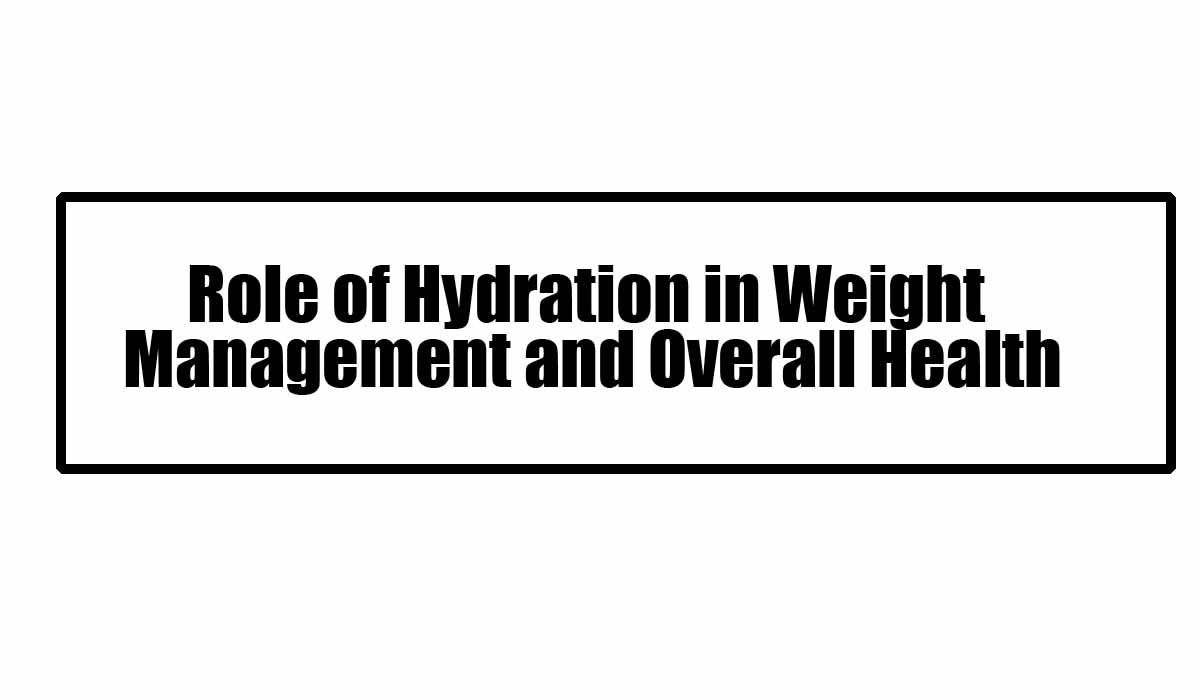Hydration is often overlooked in discussions about weight management and overall health, yet it plays a crucial role in both. Water is essential for nearly every function in the body, from regulating temperature to supporting digestion and nutrient absorption. In this article, we’ll explore how staying hydrated can help you manage your weight, improve your health, and boost your overall well-being.
1. Hydration and Metabolism
Water is a key player in maintaining a healthy metabolism. Even mild dehydration can slow down your metabolic rate, making it harder to lose or maintain weight.
How Hydration Affects Metabolism:
- Boosts Caloric Burn: Drinking water, especially cold water, can temporarily boost your metabolism as your body works to warm it up, burning calories in the process.
- Aids in Nutrient Transport: Water helps transport nutrients to your cells, ensuring your body has the fuel it needs to keep your metabolism running smoothly.
Tip: Start your day with a glass of water to kickstart your metabolism and keep it running efficiently throughout the day.
2. Water as an Appetite Suppressant
Drinking water before meals can help control your appetite, leading to lower calorie intake and, ultimately, weight loss.
How Water Suppresses Appetite:
- Fills Your Stomach: Drinking water before meals can create a feeling of fullness, reducing the likelihood of overeating.
- Reduces Caloric Intake: Studies have shown that individuals who drink water before meals tend to consume fewer calories.
Tip: Aim to drink a glass of water 30 minutes before meals to help manage portion sizes and reduce calorie intake.
3. Hydration and Exercise Performance
Staying hydrated is crucial for optimal exercise performance, which is directly linked to weight management and overall health.
How Hydration Enhances Performance:
- Prevents Fatigue: Proper hydration helps maintain energy levels during workouts, preventing early fatigue and allowing you to exercise longer and more effectively.
- Supports Recovery: Water aids in muscle recovery by helping to transport nutrients and remove waste products from muscles.
Tip: Drink water before, during, and after your workouts to stay hydrated and maximize your exercise efforts.
4. Hydration and Digestion
Water is essential for proper digestion and nutrient absorption, both of which are important for weight management and overall health.
How Water Affects Digestion:
- Prevents Constipation: Adequate hydration keeps your digestive system moving smoothly, preventing constipation and bloating.
- Aids in Nutrient Absorption: Water helps break down food and dissolve nutrients, making it easier for your body to absorb them.
Tip: Make it a habit to drink water with your meals to support digestion and nutrient absorption.
5. Hydration and Detoxification
Water plays a vital role in detoxifying your body, which is essential for maintaining a healthy weight and overall well-being.
How Hydration Aids Detoxification:
- Flushes Toxins: Water helps flush toxins and waste products from your body through urine, sweat, and bowel movements.
- Supports Kidney Function: Staying hydrated supports kidney function, which is essential for filtering waste from your blood.
Tip: Aim to drink at least 8 glasses of water per day, more if you’re active or live in a hot climate, to support your body’s natural detoxification processes.
6. Hydration and Skin Health
Your skin is the largest organ in your body, and staying hydrated is key to keeping it healthy and vibrant.
How Water Benefits Skin Health:
- Maintains Elasticity: Proper hydration helps maintain your skin’s elasticity, reducing the appearance of fine lines and wrinkles.
- Prevents Dryness: Drinking enough water keeps your skin hydrated from the inside out, preventing dryness and flakiness.
Tip: Combine hydration with a good skincare routine to achieve a healthy, glowing complexion.
7. How to Stay Hydrated
Staying hydrated doesn’t have to be complicated. Here are some simple strategies to ensure you’re getting enough water each day.
Practical Tips for Staying Hydrated:
- Carry a Water Bottle: Keep a reusable water bottle with you at all times to remind yourself to drink water throughout the day.
- Infuse Your Water: Add slices of fruit, cucumber, or herbs to your water for a refreshing flavor boost without added calories.
- Eat Water-Rich Foods: Include water-rich foods like cucumbers, watermelon, and oranges in your diet to boost your hydration levels.
Tip: Set reminders on your phone to drink water at regular intervals, especially if you have a busy schedule.
8. Signs of Dehydration
Recognizing the signs of dehydration is essential for maintaining optimal hydration levels and avoiding potential health issues.
Common Signs of Dehydration:
- Thirst: The most obvious sign that your body needs water.
- Dark Urine: If your urine is dark yellow or amber, it’s a sign you need to drink more water.
- Dry Skin: Dehydrated skin may appear dry, flaky, and less elastic.
- Fatigue: Feeling tired or sluggish can be a sign that you’re not getting enough water.
Tip: Pay attention to these signs and increase your water intake if you notice any of them.
Conclusion
Hydration is a fundamental aspect of weight management and overall health. By staying hydrated, you can boost your metabolism, control your appetite, enhance exercise performance, and support your body’s natural detoxification processes. Make water a priority in your daily routine, and you’ll be well on your way to achieving your health and fitness goals.

